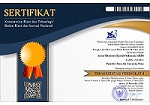Inovasi Financial Technology (Fintech) pada Asuransi Syariah (Studi kasus: PT Duta Danadyakasa Teknologi)
Abstract
This study aims to identify problems, solutions and strategies in decision making of fintech innovation insurance, with the approach method is Analytic Network Process (ANP). The data collections which are depth interview and questionnaire were collected from the respondent. The results showed that the priority issues faced in fintech innovation insurance are human aspect which consists of human resource lacks and regulatory challenges; product aspect which consists of product penetration and asset market penetration fractional shari’ah. Solutions which are needed in fintech innovation insurance are aspect human which consists of resource and regulation minimalism; product aspect which consists of product research and product innovation. Strategies in fintech innovation insurance are socialization, education, cooperation and digital marketing. Socialization gives the most influence on fintech innovation insurance to introduce fintech in facing digital era. Education needs to be held periodically as well as in the process of fintech to get the assistance of the Otoritas Jasa Keuangan (OJK) as a regulatory to comply with the government policy. It needs the cooperation among companies from being charged business model with the existence of promos for insurance participants or potential participants so that people recognize and be interested, invite to all society levels of the insurance importance in life to reduce any risk that might occur and to invite all people participating in fintech innovation.
Keywords: Analytic Network Process, islamic insurance, fintech
Full Text:
PDFReferences
Ascarya. (2005). Analytic Network Process (ANP): Pendekatan Baru Studi Kualitatif, Pusat Pendidikan dan Studi Kebanksentralan, Bank Indonesia.
Asuransi Digital Untuk Kaum Milenial. (2019, Jul 8). Dunia Fintech.
Catlin T., Paliath P,dkk. 2014, Insurance companies Untapped Digital Opportunity, “Harvard Business Review”, March, https://hbr.org/2014/03/insurance-companies-untapped-digital-opportunity (access: 09.12.2018)
Chrismastianto, I. (2017). Analisis SWOT Implementasi Teknologi Finansial Terhadap Kualitas Layanan Perbankan di Indonesia. Jurnal Ekonomi dan Bisnis, Volume 20 (1).
Intarto, E. A. (2018). Fintech dan Cashless Society: Sebuah Revolusi Pendongkrak Ekonomi Kerakyatan. Essay Booklet; The Transformative Power of Fintech.
Irfan, A. (2018). Dirut Bjb: Perbankan dan Fintech Bisa Bersinergi. Diakses pada 8 Juli 2019 dari https://bisnis.tempo.co
Iqbal, M. (2006). Asuransi Syariah dalam Praktik. Jakarta: Gema Insani Perss.
Leliya, M.K. (2012). Minat Masyarakt Berasuransi Syariah di Asuransi Prudential.
Napitupulu, Rubini Aldi Firmansyah, dkk. (2017). Kajian Perlindungan Konsumen Sektor Jasa Keuangan: Perlindungan Konsumen Pada Fintech Jakarta : Departemen Perlindungan Konsumen OJK.
Muchlis, R. (2018). Analisis SWOT Financial Technology (Fintech) Pembiayaan Perbankan Syariah Di Indonesia (Studi Kasus 4 Bank Syariah Di Kota Medan). At-Tawassuth,Volume III (2)
Rusydiana, A.S. (2018). Bagaimana Mengambangkan Industri Fintech Syariah di Indonesia? Pendekatan Interpretive Structural Model (ISM). Jurnal Al-Muzra’ah Volume 6 (2)
Saaty, T.L., & L.G Vargas. (2006). Decision Making with the Analytic Network Process: Economic, Political, Social and Technological Applications with Benefit, Opportunities, cost and Risks. 2nd Edition.Springer Science+ Business Media. New York
Sari,A.R. (2015). Faktor-faktor Yang Mempengaruhi Kurangnya Minat Masyarakat Muslim di Bank Syariah (Studi Kasus Masyarakat Muslim di Kabupaten Bantul Yogyakarta).
Tanjung, H & Devi,A. (2013). Metodologi Penelitian Islam. Jakarta: Gramata Publishing.
Yusandani, A.M. (2018). Analisis Yuridis Perjanjian Asuransi Digital (Studi Pada PT FWD Life Indonesia). Skripsi. Universitas Lampung.
DOI: http://dx.doi.org/10.21927/jesi.2019.9(2).94-103

This work is licensed under a Creative Commons Attribution-ShareAlike 4.0 International License.
Editorial Office:
Faculty of Islamic Economics and Business, Universitas Alma Ata
Jl. Brawijaya No.99, Jadan, Tamantirto, Kec. Kasihan, Kabupaten Bantul, Daerah Istimewa Yogyakarta 55184

JESI by http://ejournal.almaata.ac.id/index.php/JESI is licensed under a Creative Commons Attribution-ShareAlike 4.0 International License.





